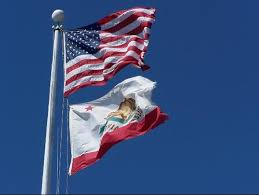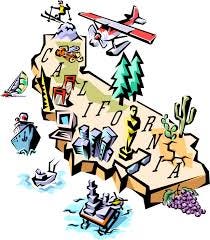Issue #201: Should California Dems form a nation-state caucus?
ICI brings you this week's news highlights
As the election looms, it is more important than ever to keep a source of independent and in-depth California news coming. If you can afford it, now is a great time to chip in to keep our volunteer-run newsletter going!
Proposal for California nation-state caucus!
What you need to know about the state propositions
Plan B contemplated as Elon Musk trashes the state that made him rich
Was this email forwarded to you? Become a free subscriber here.
SPECIAL REPORT FROM ICI EXECUTIVE DIRECTOR
Why California needs a nation-state caucus (and how it could work)
CC Marin, Independent California Institute
“California taxpayers already pay our own way. If you haven’t seen the Balance of Payments Portal from the New York-based think tank the Rockefeller Institute, you should definitely check it out. If you do, one thing you’ll notice is that the federal government is at best a break-even proposition for California taxpayers: In 2022, the most recent year for which the portal has data, Californians actually got back 90 cents for every dollar we paid in taxes, whereas our neighbors in Arizona actually got more than $1.50. Californians also paid in more than we got back in 2015 through 2019. During 2020 and 2021, the Covid years, Californians did get a bit more spending than we put into the system, but so did every state in the country.
The Rockefeller Institute’s data only goes back to 2015, but I’ve looked at other data (and gathered some tax data of my own), and California has had a break-even fiscal relationship with the federal government going back to the late 1990s. Put another way, all the “federal dollars” spent in California ultimately came from California taxpayers.
A Nation-State Caucus could inject a dose of reality into California politics. Rather than selling Californians on “leading the nation” from within a federal system that’s stacked against us in nearly every way, the Nation-State Caucus could focus on doing a better job protecting Californians from that system. Californians should get a chance to lead ourselves before we take on the burden of leading Americans.
And, California politicians, if you must stroke Californians’ egos, keep in mind that there are a lot of countries that are much more receptive to our ideas on climate change than the United States. Why screw around with “leading the nation” when we’re so much more effective at leading the world?”
PREPARING PLAN B
California Gov. Newsom’s new Trump-proofing plan
Christopher Cadelago, Politico
“Spurred by former President Donald Trump’s recent threats to withhold disaster relief funding over disagreements on water policy, Newsom said he’s making plans to free up state funding in case of retaliation.
Newsom’s administration has been preparing to defend California’s climate-mitigating policies against Trump: It’s been stress-testing its climate laws, looking to make deals with industry to circumvent lawsuits and calling on the Environmental Protection Agency to grant California permission to implement clean air regulations ahead of the election.
But this is the first indication that Newsom’s also defending the state’s attempts to stem the effects of climate change.
“This is serious,” Newsom said of Trump’s threats. “He’s serious about this.”
Newsom didn’t say how much money he’d lay aside, but said he’d propose establishing an account the state can immediately draw on for emergencies if Trump refuses to provide federal dollars.”
Poll: If Trump wins the White House, Californians want their next senator to fight back
Laura J. Nelson, LA Times
“If President Trump is elected in November, California voters have a clear message for the Golden State’s next senator: Protect us.
If Kamala Harris is elected, however, Californians want to see their next senator focus on legislation that helps the state as much as possible.
Nearly 6 in 10 likely California voters would want to see the state’s next senator prioritize “protecting California’s interests and opposing federal legislation that would undercut existing state laws and policies” if Trump is elected, the poll found.
More than 4 in 5 Schiff supporters, and more than half of undecided voters, say that protecting California’s interests should be a top priority.”
Trump or no Trump, California is worried
When it comes to the courts, former President Donald Trump may have already won.
Blanca Begert, Politico
“For months, leaders at every level of government have been calling on the Environmental Protection Agency to grant California eight pending waivers to implement its clean air regulations ahead of the election. They’ve been looking to alternative funding streams for climate projects and striking deals with industry to circumvent lawsuits.
But they’re also realizing that no matter who wins in November, many of their climate rules could end up before a Supreme Court stacked with Trump appointees hostile to climate regulation.”
Opinion: Donald Trump vows vengeance on California. Should we believe him?
Mark Z. Barabak, San Jose Mercury News
“There’s no love lost between Trump and California. If you ranked the 50 states in terms of his personal regard, it’s a good bet California would finish dead last. The GOP nominee loathes Gov. Gavin Newsom — a feeling that’s mutual — and his depiction of life in the Golden State makes the seventh circle of Hell sound like a resort vacation.
But Trump didn’t just trash California on his ego trip last weekend to Coachella. If elected, he vowed to punish the state — which is to say its more than 39 million residents — by withholding federal disaster aid should California’s leaders refuse to give more water to farmers and cities. (That would come at the expense of the environment and others denied their share.)
The remarks echoed a threat Trump made last summer, holding forth at his Rancho Palos Verdes golf course, where the former president explicitly singled out Newsom. “If he doesn’t sign those papers,” Trump told reporters, “we won’t give him money to put out all his fires.” It was unclear what papers Trump referred to, but there was no mistaking his strong-arm sentiment.”
BY THE NUMBERS
Californians trust Sacramento more than Washington
Lauren Mora, Public Policy Institute of California
“Across regions, trust in Sacramento and in Washington is highest among San Francisco residents (50% state, 36% federal) and lowest in the Central Valley (36% state, 25% federal). African American, Asian American, and Latino residents (48% each) are more likely than white residents (34%) to trust California’s government, and when considering the national government, trust is higher among African American residents (47%) than other racial or ethnic groups. Trust in the state government increases among college graduates, while trust in the federal government is higher among residents with a high school diploma or less. Young adults, 18 to 34, express a higher level of trust toward the state government, while trust in the federal government is similar across age groups.”
California’s record-shattering heat wave explained in five numbers
Anthony Edwards & Jack Lee, SF Chronicle
“95 degrees
35 million
117 degrees
132 years
3.1 degrees”
ELON MUSK IN THE NEWS
Elon Musk has a warning about California
Jeremy B. White, Politico
“Elon Musk’s relationship with California has always been complicated — but Musk’s MAGAfication has made it downright rancorous.
The tech executive amassed the world’s largest fortune by building Tesla into an automotive juggernaut, anchored by an East Bay manufacturing plant, and firing SpaceX rockets from the Southern California desert and central coast. Billions of dollars in state subsidies helped him prosper.
But along the way, even as Musk forged relationships with Democratic politicians like Gov. Gavin Newsom, he began to turn on the state that helped make him.”
Elon Musk’s messy breakup with California rages on
Musk and California seemed like the perfect match. What soured?
Ryan Fonseca, LA Times
“The wealthiest man on the planet has been pouring millions into the 2024 election in an effort to propel Donald Trump back into the White House and protect Republican seats in Congress.
In three months alone, Elon Musk added almost $75 million into his America PAC, which has spent over $110 million to support GOP candidates, with the largest share going to tight California congressional races, my colleagues Laura J. Nelson and James Rainey reported this week.
Musk and his companies have faced numerous violations, lawsuits, fines and settlements in and out of California, including for air pollution at Tesla’s Fremont plant, workplace safety violations, labor practices and mishandling hazardous waste.
More recently, the California Coastal Commission rejected SpaceX’s plan to increase its rocket launches from Vandenberg Space Force Base. Panel members raised concerns about the impacts on local wildlife but some also took issue with Musk’s political posts and his companies’ labor records.
Now SpaceX is suing the commission, alleging “naked political discrimination” against Musk.
The billionaire took to his social media platform, calling the state panel an “insufferable and misanthropic group of Karens” and saying it should be dissolved.”
Why CalPERS is being pushed to divest from Tesla
Lynn La, CalMatters
“On Wednesday, LatinoJustice and the National Institute for Workers’ Rights sent a letter to State Controller Malia Cohen pushing for the California Public Employees’ Retirement System to get rid of its Tesla holdings, arguing that the company’s values are “misaligned,” and that Musk’s claims that promoting diversity is as morally wrong as racism is “indefensible.” Cohen is a board member of CalPERS, which had $530 billion in assets as of Tuesday.
The letter: “In the face of continued occupational segregation and wage disparities by race, national origin, and gender, DEI efforts are an economic and social imperative. California’s public sector workforce is incredibly diverse, with 60% of civil service employees in the state being non-white.”
The letter also cited Tesla’s $3.2 million March settlement to a Black former employee who accused the company of racial discrimination as an example of its “troubling values.” The settlement came a month after Tesla dropped prior language from its regulatory filings that supported employee resource groups and fostering diversity.”
Judge blocks California deepfakes law that sparked Musk-Newsom row
Tyler Katzenberger, Politico
“A federal judge on Wednesday blocked a California measure restricting the use of digitally altered political “deepfakes” just two weeks after Gov. Gavin Newsom signed the bill into law.
The ruling is a blow to a push by the state’s leading Democrats to rein in misleading content on social media ahead of Election Day.
Chris Kohls, known as “Mr Reagan” on X, sued to prevent the state from enforcing the law after posting an AI-generated video of a Harris campaign ad on the social media site. He claimed the video was protected by the First Amendment because it was a parody.
The judge agreed.”
We love to hear from readers like you! Please reply to this email with suggestions for the next issue.
LOOKING AT CALIFORNIA
California explains it all
To understand US politics—for better and for worse—look to the Golden State.
Ned Resnikoff, The Nation
“In the preface to California: A History, Kevin Starr writes that California is perhaps “the most American of American places” and that it has long “become one of the prisms through which the American people, for better and for worse, could glimpse their future.” Starr, often called the dean of California historians, wrote this in 2005 and died in 2017—but his insight is perhaps most obvious today.
California’s long-brewing housing crisis is now a national phenomenon, and so is the mass homelessness that has been its inevitable consequence. For years, the state’s wildfires and heat waves have given Americans a vision of the country’s disastrous climate-change fate. Show business and Big Tech, having colonized the state’s political culture, have gone on to take over most everything. Meanwhile, the rest of the United States has grown to more closely resemble California in its visible diversity, as queerness, immigration status, and other forms of difference have become more legible in American public life.
In other words, California’s idiosyncratic political economy is becoming less idiosyncratic and more of a national condition. In some sense, this is nothing new: A broad array of American social realities, from widespread suburbanization to the peculiarities of post–New Deal radical politics, can trace much of their lineage back to California. But it has been a long time since developments in California have shaped the nation’s politics to such an extraordinary degree.”
Are California’s forests becoming more resilient to wildfire? State leaders say yes
Kurtis Alexander, SF Chronicle
“The amount of forestry work is up over prior years, the data show, and fire officials say it is already helping temper the severity of wildfires. Still, the treated acreage represents only about 2% of California’s forested lands. Experts have estimated that at least 1 million acres of forestry projects annually are needed to significantly improve conditions on the ground and put a major dent in the wildfire crisis.
State agencies under Gov. Gavin Newsom and the U.S. Forest Service have each committed to performing 500,000 acres of work by 2025, which would bring the state to the 1 million-acre annual goal. Whether California will hit that mark this year or next remains to be seen.”
California tribes seek to stop plans for state’s largest reservoir in decades
Kurtis Alexander, SF Chronicle
“The Native American ties to this rural stretch of Northern California have emerged as the latest point of contention in the bid to build the $4.5 billion Sites Reservoir. In recent weeks, a handful of tribes concerned about disturbing a special spot have stepped up efforts to stop the project, even as supporters laud it as one of the state’s best answers to drought.
The area where the 13-mile-long reservoir is proposed, around the small, unincorporated community of Sites, holds not only collective memories for the tribes but physical remnants of their past. These include relics of settlements, burial sites and sacred stones such as “Medicine Rock” and “Poison Rock,” some of which are still used in cultural practices today. All are markers of a place where indigenous people lived, worked and worshiped.”
NATIONAL DIVORCE
Jason Fry proposes split as peace plan
In new book, Texan argues that it’s time to plan for divorce
National Divorce: A Plan for Peace, by Jason Fry
“America is in crisis, and the differences between people, states and parties are irreconcilable. Many doubt whether their state’s relationship with the Federal Government is a beneficial one.
The looming question is not if the United States will break up, but when. This book makes the case that a negotiated split represents the most likely chance for a peaceful outcome.
By committing to legislative processes, nonviolence, and a good dose of “live and let live,” cities, states, and individuals can regroup in ways that better suit their preferences. National divorce is the peaceful path for every American to have it their way, right now.”
ELECTION INFO
What you need to know about California’s ballot propositions
CalMatters
“With your choices, you’ll help steer state policy on crime, health care, rent control and more. You can change the state constitution on gay marriage and involuntary labor. You’ll also decide whether to add $20 billion to the state debt.
Here’s more information on all 10 propositions — including videos and quizzes; who’s for and against them (and their arguments); and how much is being spent on both sides to convince voters.”















